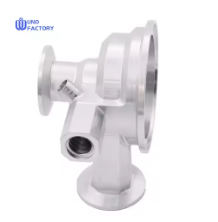Time to read: 6 min

Introduction to Aluminum Alloys in Machining CNC machining is a dynamic process that accommodates a plethora of materials. Among these, aluminum alloys are favored for their machinability and cost-effectiveness. With a spectrum of grades available, aluminum alloys cater to diverse machining needs, from structural components in construction to intricate parts in aerospace engineering.
Understanding Alloys An alloy is a blend of metals, often combined with non-metallic elements, to enhance specific properties. In the context of machining, aluminum alloys are predominantly composed of aluminum with additives like iron, copper, and magnesium. These elements significantly influence the alloy's physical characteristics, including strength, ductility, and resistance to corrosion.
Classification of Aluminum Alloys Aluminum alloys for machining are categorized into three groups: commercially pure aluminum, heat-treatable alloys, and non-heat-treatable alloys. This article focuses on the latter two groups, which are more commonly used in machining due to their superior properties.
Heat-Treatable Alloys
Aluminum 2024
Known for its exceptional strength-to-weight ratio, Aluminum 2024 is a popular choice in the automotive and aerospace industries. Despite its susceptibility to corrosion, its fatigue resistance makes it ideal for high-stress applications.
- Tensile Strength: 68,000 psi
- Major Alloying Elements: Copper
- Applications: Car parts, aircraft components, and transportation equipment
Aluminum 6061
A versatile alloy, Aluminum 6061 is widely used in general manufacturing due to its balance of strength and workability. It is a staple in the production of electronic and aircraft parts.
- Tensile Strength: 45,000 psi
- Major Alloying Elements: Magnesium, Silicon
- Applications: Structural components, consumer goods, architectural elements
Aluminum 7075
This alloy is renowned for its high strength and is often used in applications requiring extreme durability. While it can be brittle, its heat-treatable nature makes it a favorite for structural aircraft parts and sports equipment.
- Tensile Strength: 83,000 psi
- Major Alloying Elements: Zinc
- Applications: Aircraft components, sports equipment, and transportation parts
Non-Heat Treatable Alloys
Aluminum 3003
With its near-pure aluminum composition and manganese alloying, Aluminum 3003 is well-suited for household goods and chemical applications. It offers good formability and corrosion resistance.
- Tensile Strength: 13,000 psi
- Major Alloying Elements: Manganese
- Applications: Cooking utensils, chemical tanks, and roofing materials
Aluminum 5052
This alloy is prized for its strength and corrosion resistance, particularly in marine environments. It is the strongest non-heat-treatable alloy, making it ideal for applications exposed to saltwater.
- Tensile Strength: 33,000 psi
- Major Alloying Elements: Magnesium, Chromium
- Applications: Marine transport components, heat exchangers, and fuel tanks
Choosing the Right Aluminum Alloy Selecting the appropriate aluminum alloy for machining involves considering factors such as formability, weldability, machinability, and corrosion resistance. An aluminum alloy chart can serve as a quick reference to guide these decisions.
Unofactory: Your Partner in Aluminum Machining Excellence At Unofactory, we offer a comprehensive range of aluminum alloys for CNC machining, along with nearly 100 other materials for various manufacturing processes. Our online quotation platform allows you to select the ideal material for your project and request an instant quote.
Conclusion Aluminum machining's popularity stems from the material's inherent properties and the enhanced features provided by its alloys. This article has shed light on the most common aluminum alloys used in machining, providing insights into their compositions and applications. For reliable and efficient machining solutions, trust Unofactory to deliver precision and quality.




